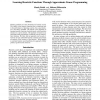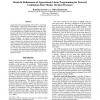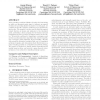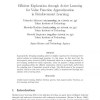72 search results - page 1 / 15 » Learning Heuristic Functions through Approximate Linear Prog... |
AIPS
2008
13 years 7 months ago
2008
Planning problems are often formulated as heuristic search. The choice of the heuristic function plays a significant role in the performance of planning systems, but a good heuris...
AIPS
2004
13 years 6 months ago
2004
Approximate linear programming (ALP) offers a promising framework for solving large factored Markov decision processes (MDPs) with both discrete and continuous states. Successful ...
SIGECOM
2009
ACM
13 years 11 months ago
2009
ACM
Policy teaching considers a Markov Decision Process setting in which an interested party aims to influence an agent’s decisions by providing limited incentives. In this paper, ...
ICRA
2009
IEEE
13 years 11 months ago
2009
IEEE
Abstract— Least-squares policy iteration is a useful reinforcement learning method in robotics due to its computational efficiency. However, it tends to be sensitive to outliers...
NN
2010
Springer
12 years 11 months ago
2010
Springer
Appropriately designing sampling policies is highly important for obtaining better control policies in reinforcement learning. In this paper, we first show that the least-squares ...




